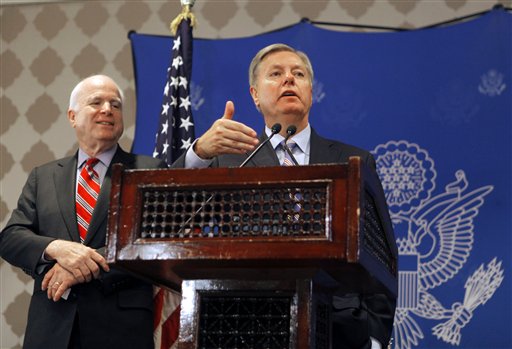SOURCE:
NEWSMAX
By Arnaud De Borchgrave
 |
| U.S. Sens. John McCain, left, and Lindsey Graham, speak to reporters in Cairo. (AP) |
Eighty percent of Americans asked say they favor a pivot — but it isn't to Syria.
Following the $2 trillion geopolitical disasters of Iraq and Afghanistan, the message is a one-word pivot — home!
Even the head of the prestigious Council of Foreign Relations, Robert Haass, says it's time to prioritize the home front where everything from roads to railroads and from bridges to balustrades has long been neglected.
Two conservative U.S. senators flew to Cairo to plead the case of the Muslim Brotherhood and to denounce what they called a military coup. This congressional sortie had zero impact and demonstrated how little two supposedly well-informed senators understand about a dictatorial theocracy that had torched Cairo Jan. 26, 1952 — 61 years ago.
No responsible official seemed to have a clue about the history of the Muslim Brotherhood.
Egypt's Gen. Abdel Fattah el-Sisi not only knows the history of the Muslim Brotherhood but acted decisively, as an unknown colonel had done six decades ago. But not before the extremist brothers had torched some 300 buildings in Cairo (Jan. 26, 1952).
For the prestigious weekly The Economist there was no doubt about the chemical weapons attack by Syria against its own citizens that killed 1,420, including 400 children. Across the forehead of a panicky looking Syrian President Bashar Assad on the Economist's cover were three words — HIT HIM HARD.
Hours after the Economist went to press, the British House of Commons, ignoring the impassionate plea of Prime Minister David Cameron, narrowly rejected the motion to punish Assad with bombs and missiles.
After much waffling, U.S. President Barack Obama decided not to decide and to leave the decision up to Congress.
France, the third nation in the triumvirate whose leaders had agreed to retaliate against Syria's chemical attack on its own citizens, also agreed to get parliamentary approval.
Sober rethinking had taken place in all three countries. Some 110,000 Syrians had already been killed in 2 1/2 years of civil war without Western interference. The Pentagon's military chiefs and the secretary of defense weren't anxious to open yet another front.
Budget constraints had forced cutbacks across the board.
The Iraq and Afghan war — each costing $1 trillion — were gigantic miscalculations. A September 2002 government dossier from British Prime Minister Tony Blair claimed that Iraq's Saddam Hussein was so advanced with his chemical and biological weapons that he could fire them with 45 minutes notice.
It was all erected on the lies of an Iraqi defector — codenamed Curveball — who made it to Germany and declined to go to the United States. Curveball admitted he made it all up so he could be reunited with his German girlfriend.
Failure to detect the lies of Curveball — even though German intelligence officials warned they were skeptical — cost the United States 4,500 killed in action and 32,000 wounded in Iraq.
The Afghan war was decided by President George W. Bush as retaliation for 9/11. The objective was to topple the country's medieval theocracy that had given shelter and training facilities to Osama bin Laden's al-Qaida terrorists.
Bin Laden and his terrorists escaped into Pakistan In early December 2001.
The 48 nations contributing under a U.N. mandate expected to be home within a year or at most 24 months.
To embark on a democracy-building policy was to demonstrate ignorance of Afghanistan's history and the tragic fate that befell its British invaders — and many others over the centuries.
In 1842, Afghan guerrillas killed 16,500 British soldiers as they tried to fight their way back into India. One was allowed to escape so the outside world would get word about fierce Afghan fighters.
In Syria today, there is much doubt the order to gas 1,400 civilians came from Assad. More likely is the speculation it was done by his enemies, gambling he wouldn't survive such a display of sheer horror.
Even with a scorecard, it is hard to figure out the players on either side. The al-Qaida terrorist component, based in Iraq, a country liberated from Saddam Hussein's dictatorship by the United States and Britain, is aligned with the heterodyne anti-Assad front.
But Assad still has Russia, China and Iran in his camp.
For the heterodyne coalition of the United States and France (sans Britain) to get involved in Syria's civil war militarily — even if only for the 48 hours envisaged by the let's-punish-Assad coalition — can only widen the conflict.
K.N. Al-Sabah, presumably a member of Kuwait's reigning family, in a letter to the Financial Times, explained the Syrian civil war in terms that would discourage even a Delta Team.
"Sir, Iran is backing Assad (of Syria).
"Gulf states are against Assad.
"Assad is against Muslim Brotherhood.
"Muslim Brotherhood and Obama are against Gen. Sisi.
"But Gulf states are pro-Sisi! Which means they are against Muslim Brotherhood!
"Iran is pro-Hamas, but Hamas is backing Muslim Brotherhood!
"Obama is backing Muslim Brotherhood, yet Hamas is against the U.S.
"Gulf states are pro-U.S.
"But Turkey is with Gulf states against Assad;
"Yet Turkey is pro-Muslim Brotherhood against Gen. Sisi.
"And Gen. Sisi is being backed by the Gulf states!
"Welcome to the Middle East and have a nice day.
KN Al-Sabah, London EC4, UK"
